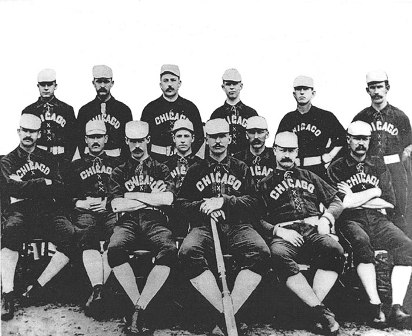Charles Roscoe “Ross” Barnes was one of the greatest players of his era, and largely forgotten today.
Barnes was a member Harry Wright’s Boston Red Stocking teams in the National Association from 1871-1875 and won the National League’s first batting title hitting .429 in 1876 as a member the Chicago White Stockings.
Teammates and contemporaries had no doubt about how good he was.
“Orator Jim” O’Rourke called Barnes “the greatest second baseman the game ever saw.” In 1896, A.G. Spalding “declared Ross Barnes to have been the greatest ballplayer in America,” and Tim Murnane said of Barnes:
“His left-handed stops of hard-hit balls to right field were the prettiest stops ever made on the Boston grounds. As a base-runner no man of the present day is his equal, and as a batsman he must be reckoned very high.”

1871 Red Stockings. Spalding, standing second from left, Barnes, standing far right, O’Rourke, seated far left.
Some of Barnes’ success was due to the rule at the time regarding balls that rolled foul in the infield, The Sporting Life said:
“It was Barnes who was the first to master the fair-foul hit. He was able to drive the ball so that it would land fair and then swing in foul just outside of the reach of the third baseman.”
Barnes became ill in 1877, although he started the season with the White Stockings, The Chicago Inter Ocean said in early May “he is now, and has been all spring, very sick with few signs of improvement.” After a slow start, Barnes was out for more than three months before returning in late August.
The Chicago Tribune said:
“Barnes made his reappearance with the Whites, and played his old position at second base, but he showed evidence of physical weakness and lack of practice,”
Barnes appeared in only 22 games, hitting .272.
The second baseman, who was earning $2500 for the season, and as was often the case in 19th Century baseball, was not paid for the time he missed. Early in 1878 Barnes filed a lawsuit against the White Stockings to collect more than $1,000 the team did not pay him while he was ill.
Cook County Judge Mason B. Loomis heard the case, which The Inter Ocean said:
“(I)s a new one in the experience of ball clubs, and the result is looked forward to with some interest in sporting circles.”
The result was not favorable for ballplayers. Judge Loomis ruled against Barnes, The Tribune said:
“This makes clear the point that players are not legally entitled to wages when laid off by sickness.”
While some owners did pay players during time missed due to illness and injury, teams had the right, after 15 days, to suspend any player without pay; and the legal precedent established in Barnes’ case remained until 1916 when the “injury clause” was rescinded.
Barnes attempted to return to the White Stockings in 1878, but The Tribune said he “has never fully recovered,” from the illness, and was released.
He played with and managed the London Tecumsehs in the International Association in 1878, then made two comeback attempts with the Cincinnati Reds in 1879, and the Boston Red Stockings in 1881, his career was over at age 31.
Barnes retired to Chicago and was working for Peoples Gas, Light and Coke Co. when he died in 1915 at age 65.



3 Responses to “The Ross Barnes Case”